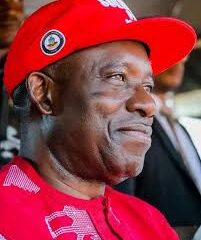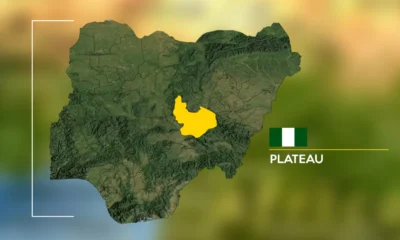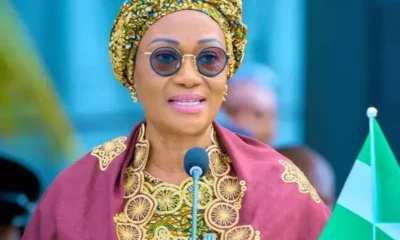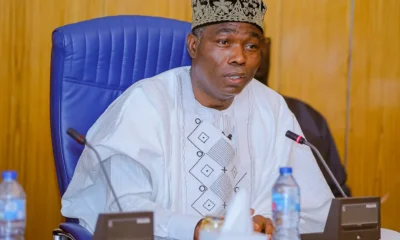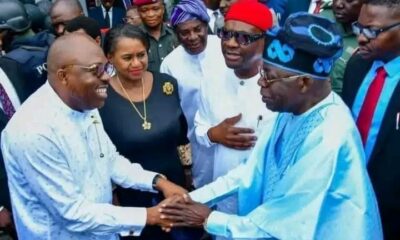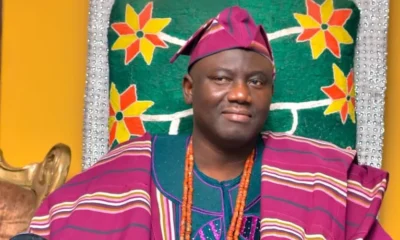News
How rich Nigerians accused of corruption benefit from ‘Out-Of-Court’ settlements
Former Adamawa State Governor Murtala Nyako has faced corruption charges for 10 years. Neither acquitted nor convicted, he and his co-defendants, including his son, Abdulaziz, a former senator, are tired of the trial. They want the case to end, even though the Court of Appeal ruled that there is merit in trying them for corruption.
The Economic and Financial Crimes Commission (EFCC) charged them in 2015 with diversion of N29 billion from the coffers of Adamawa State through a money laundering scheme during Mr Nyako’s time as governor.
The case is one of the longest and most complicated high-profile corruption cases filed during former President Muhammadu Buhari’s administration.
It has passed through three judges, two of whom left the case due to death or promotion.
Together, the two botched trials presented about 29 witnesses, while the case journeyed to the Court of Appeal and back to the trial court. In its 10th year, the prosecution struggles to begin afresh before the third judge.
At the defendants’ re-arraignment on the 37 money laundering charges before the third judge in March last year, prosecution lawyer Leke Atolagbe reported that the defendants were in plea bargain talks with the authorities.
But defence lawyer Michael Aondoakaa, the Attorney-General of the Federation (AGF) during the late President Umaru Yar’adua’s administration, countered the prosecutor’s claim. He said his clients were not admitting guilt but seeking an “amicable settlement” of the case.
“Plea bargain creates the impression of guilt. The admiral is 81 years old; he is an agemate of the likes of retired General Badamosi Babangida, and he cannot continue to be made to face this again,” Mr Aondoakaa told the court.
The “amicable settlement” window means more than a reprieve for the octogenarian. It is a mark of inequality along the socio-economic divide in Nigeria’s criminal justice system.
“As it stands, it is like saying there is one law for the rich and another for the poor,” a lawyer, Emmanuel Ameh, told PREMIUM TIMES. “It is a clear case of gross inequality between the haves and the have-nots, between the rich and the poor.”
Hefty profile, hefty case
Mr Nyako’s towering profile fits the privileged side of the virtual divide.
A storied retired admiral in the Nigerian Navy, Mr Nyako was, at various times, the Chief of Naval Staff, the Deputy Chief of Defence Staff, and the pioneer military governor of Niger State in a glittering military career.
After Nigeria’s return to civil rule in 1999, he became Adamawa State governor in 2007, winning a second term in 2011, which was cut short by a few months following his removal from office by the state House of Assembly in 2014.
He is also married to a senior judge, Binta Nyako, who is currently serving on the bench of the Federal High Court in Abuja, where he is being prosecuted. His son, Abdulaziz, a former senator, is also a defendant.

His profile is as heavy as the weight of the charges and complexity of the trial.
The case has cost inestimable public resources and been a gruelling drain on judicial time.
It started in 2015 when the EFCC charged the father and son, and one Abubakar Aliyu, alongside five firms, with money laundering involving N29 billion in the Adamawa State Government’s public fund. The companies are Blue Opal Limited, Sebore Farms & Extension Limited, Pagoda Fortunes Limited, Tower Assets Management Limited, and Crust Energy Limited.
The first judge to be assigned the case, Evoh Chukwu, sat on it between 7 August 2015 and June 2016, when he suddenly died after the prosecution had called eight prosecution witnesses.
The case started afresh before the second judge, Okon Abang, and progressed till the prosecution closed its case with 21 witnesses and piles of documentary exhibits. Mr Nyako and his co-defendants were to open their defence. But instead, they filed a no-case submission, calling on Mr Abang to dismiss the case. They said the evidence against them did not link them to any alleged crimes.
But finding no merit in the request, Mr Abang dismissed it.
Unrelenting, however, the defendants appealed against the decision. On 18 January 2022, a three-judge panel of the Court of Appeal in Abuja, led by Olabisi Ige (now retired), unanimously upheld Mr Abang’s ruling, affirming that the defendants had a case to answer in view of the weight of evidence presented by the prosecution. The appellate court ordered them to enter their defence at the trial court.
The evidence the defendants were required to defend comprised the testimonies of 21 prosecution witnesses at the trial court and heaps of documentary exhibits, including bank records. Witnesses from the EFCC, Diamond Bank, GTBank, Ecobank, and others testified on how billions from Adamawa State were transferred in tranches into the accounts of companies linkedto Mr Nyako, including Crust Energy, Pagado Fortunes, Blue Ribbon, and Tower Assets Management.
But months after the Court of Appeal ruling, the Federal High Court could not proceed as ordered. The defendants repeatedly asked for adjournments to prepare for their defence, while also exploring the “settlement” option behind the scenes. The stalemate remained until Mr Abang was elevated to the Court of Appeal bench on 20 September 2023, losing the power to continue to hear the case.
The case had to be reassigned to another judge, Peter Lifu. That meant the new judge had to start the trial all over again. The toiling, time, and resources committed to the trial in the previous eight years had come to nought.
The EFCC re-arraigned the defendants before the new judge in March 2024. The prosecution was to start presenting its witnesses and exhibits afresh. But as soon as the re-arraignment occurred, the defendants informed the judge of their ongoing “out-of-court settlement” negotiation with the EFCC and the Attorney-General of the Federation (AGF), Lateef Fagbemi. The off-camera settlement talks have stalled the trial and left the future of the case uncertain.
Out-of-court settlement, the elites’ device
Monday Ubani, a Senior Advocate of Nigeria, said such settlement talks are “permissible between private individuals, especially when stolen funds or property are recovered.”
But he said, “Such deals do not apply to serious crimes like murder, fraud, kidnapping, terrorism or money laundering.”
Another lawyer, Maxwell Opara, expressed the same view in a separate interview with PREMIUM TIMES: “There is no such thing as an out-of-court settlement in state-prosecuted criminal cases.”
Nigerian law provides for nolle prosequi, which is a transparent withdrawal of charges in the public interest. Plea bargaining is another mechanism aimed at softening the punishments of remorseful offenders by allowing the accused person to plead guilty in exchange for a lighter sentence.
Sections 174 and 211 of the Nigerian Constitution empower the Attorney General of the Federation or of a state to withdraw charges at any stage of the trial, while Section 270 of the Administration of Criminal Justice Act (ACJA) 2015 sets out the procedure.
But given the historical abuse and lack of transparency in their use in Nigeria, both legal processes set off the alarm of shadiness. Even though the law hinges their use on public interest, the processes have been countlessly deployed to achieve political ends or other personal interests.
Former AGF Abubakar Malami confirmed this reality in his memoir, ‘Traversing the Thorny Terrain of Nigeria’s Justice Sector: My Travails and Triumphs,’ which he released weeks before the end of his tenure in office in May 2023. In the book, Mr Malami confirmed a public notion that former Gombe State Governor Mohammed Goje’s corruption charges were dropped in 2019 for him to step down from the Senate President race for the Buhari administration’s preferred candidate, Ahmad Lawan.

Wary of the public resentment a direct request for withdrawal of charges raises, politically exposed persons facing trial have adopted friendlier “out-of-court settlement”, more known with civil cases, to blunt the public’s curiosity.
“What we often see are secret negotiations that end in the withdrawal of charges without explanation,” said Mr Emmanuel.
The lawyer said the practice highlights the socio-economic divide, setting different rules for the privileged and underprivileged suspects.
Only privileged defendants with connections to power and a deep pocket to hire the most influential lawyers have the temerity and opportunity to seek to withdraw a criminal case after the prosecution’s evidence has been adjudged to be firm and credible.
“In all my years of practice, I have yet to see any AGF withdraw a case of a poor man or discontinue it,” Mr Emmanuel said.
Not a mission impossible
Mr Nyako is not the only one trying to influence the Tinubu administration to end his trial.
Days after the former governor’s out-of-court settlement plan was mentioned in court, Dibu Ojerinde, a professor and former Registrar of the Joint Admission Matriculation Board (JAMB), requested time for a possible settlement of his case. In 2021, the Independent Corrupt Practices and other related offences Commission (ICPC) charged him alongside his children with a N5.2 billion procurement fraud.

Like Mr Nyako’s case, the judge has dismissed the defendants’ no-case submission. Yet, inspiration to push for the withdrawal of their charges abounds, confirming that their mission is not impossible.
In August, the Tinubu administration withdrew the N20 billion fraud case against Ahmed Kuru, the former Managing Director of the Asset Management Corporation of Nigeria (AMCON).
In June, the AGF also halted EFCC’s move to arraign Honeywell Group chairman Oba Otudeko over an alleged N12.3 billion fraud. Earlier this year, the attorney-general withdrew criminal charges against Fidelity Bank CEO Nneka Onyeali-Ikpe in a multi-billion-naira fraud case.
The subnational level is also not overlooked. In 2023, the Katsina State Government withdrew an N11 billion fraud case against former Governor Ibrahim Shema.
Yet, the privileges of the influential people are not limited to the withdrawal of charges at any trial stage.
During President Buhari’s administration, Joshua Dariye and Jolly Nyame, former governors of Plateau and Taraba states, respectively, were pardoned after the Supreme Court confirmed their convictions and a few months after they were jailed.
Orji Kalu, former governor of Abia State and serving senator, travelled a similar path. His trial on corruption charges also took full swing, and he was jailed for 12 years in December 2019. However, five months into jail, the Supreme Courtcancelled his conviction and ordered a retrial. But since then, the retrial has stalled due to legal obstacles.

Mr Nyako’s frantic efforts to terminate his trial at this stage indicate his plan not to leave things to chance as the trial proves intractable.
Public interest trumped
Legal experts said the power of the attorney general at any level of government to withdraw charges is to be exercised to promote public interest.
“Unfortunately, in the Nigerian context, the law doesn’t define public interest. It’s left open, which is a problem,” explained Mr Ubani.
According to him, situations that warrant termination of charges in public interest include when the evidence is insufficient, or when an accused is needed as a prosecution witness “in a more significant case”.

However, he lamented, “The so-called settlements in Nigeria are not about public interest but political favour.”
Mr Ameh described the AGF’s decision to discontinue long-running trials as a “waste of public funds and judicial time,” as politicians often kept cases in court until defendants grew old.
Legal experts say ordinary Nigerians rarely consider out-of-court settlements, unlike high-profile individuals, highlighting stark inequality. To them, letting politicians walk free despite strong evidence while the poor face the full weight of the law erodes accountability, entrenches inequality, and fosters impunity among the political class.
To guarantee accountability, Mr Ubani called for structural reform, including separating the Attorney-General’s office from the Ministry of Justice. He suggested the AGF be independent, possibly elected, to ensure decisions serve the public interest.
Mr Okpara said dropping criminal cases against politically exposed persons signals that crime is negotiable. He said the EFCC, ICPC, and judiciary risk losing public trust if they appear complicit in opaque deals, which could provoke public anger.
(Premium Times)
-

 News18 hours ago
News18 hours agoSouth-East Breathes as Monday Sit-at-Home Officially Ends; Markets and Schools Reopen
-

 News17 hours ago
News17 hours agoGunmen Kill One, Abduct Imam, 7 Others In Plateau Community
-

 Politics17 hours ago
Politics17 hours ago‘Stop Funding Your Oppressors’ — Angry Youths Launch Boycott of Odogwu Bitters and Celebrity Channels Over Political Ties
-

 News17 hours ago
News17 hours agoI Never Thought Trump Would Recognise Me – Remi Tinubu
-

 Politics18 hours ago
Politics18 hours ago‘Put E-Transmission in Law or Resign’ — SDP’s Adewole Adebayo Issues Ultimatum to Tinubu and NASS
-

 Politics3 hours ago
Politics3 hours agoRivers Peace Accord: Tinubu Orders Wike to Halt Impeachment, Hands APC Structure to Fubara
-

 News3 hours ago
News3 hours agoOyo princes launch court fight to preserve Alaafin’s supremacy
-

 Opinion18 hours ago
Opinion18 hours agoMarriage and money: When comparison turns love into pressure



